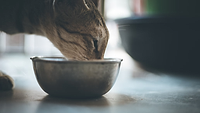Fifth Recall Reveals Known Contamination at Raw Pet Food Plant

A Washington-based raw pet food company is issuing its fifth product recall since 2016 due to possible pathogenic contamination.
Arrow Reliance Inc. (dba Darwin’s Natural Pet Products) has issued a voluntary recall of various meat and organic vegetable meals because they may contain either Salmonella or Escherichia coli O128. As this latest series of recalls is being widely circulated in the media, it is also being reported that the manufacturer was well aware of Salmonella contamination at the plant, according to Food Safety News.
Previous inspections from 2017 reportedly cite more than 300 customer complaints involving ill pets, and also pet deaths after consuming products made by Darwin’s. The inspection records also prove numerous food safety violations at the facility.
Furthermore, inspection records appear to show that leadership at the Darwin’s plant knew of the contamination. There were instances of Salmonella found on equipment and thermometer verification logs failures, for example, but no records of corrective action were mentioned or located.
Inspection records also indicate that between January 2017 and December 2017, 332 customer complaints were logged. These complaints were due to a variety of problems—foreign material contamination (hair net material, metal, pebbles, plastic, rubber bands), product spoilage, package leaks, and sick and dying pets.
Food Safety News was also able to dig up a laundry list of violations cited in Darwins’ inspection reports:
- In addition to reporting on Darwin’s records, investigators recorded the following general “objectionable” conditions:
- Failure to conduct operations under cGMPs (current Good Manufacturing Practices);
- Raw materials were not thawed under conditions that would minimize the potential for growth of undesirable pathogens;
- Animal food contact surfaces not made of appropriate materials or maintained to protect animal food from becoming contaminated; and
- Equipment and utensils not used appropriately to avoid adulteration of animal food with contaminants.
Inspectors also cited the following specifics in their report:
- A mallet with raw meat material on it was on a rack used to store sanitized equipment in the sanitizing room;
- 4-wheeled hand cart with two shelves covered with wet cardboard containing raw meat. Cart was touching a food preparation surface. Buckets used to carry and mix micro ingredients and phage preparation stored on the cart. Cart handle was broken and surface appeared to not be cleanable;
- Dirty tool from processing floor placed on top of sanitized yellow pallet;
- Food preparation table grooved and not cleanable;
- Flashing between wall and floor and behind prep table was damaged and contained meat debris;
- Employee observed breaking down dirty cardboard boxes with gloved hands and returning to processing floor without changing gloves or sanitizing;
- Freezer box “B” had bloody and rusted metal racks; bloody floors and boxes storing frozen meat; organic material behind racks;
- Cooler box “A” had bloody boxes of meat and vegetables stored on metal racks and pallets with organic material behind racks;
- Cardboard boxes containing raw meat were observed leaking and dripping blood onto boxes stored below and onto adjacent boxes, pallets and metal racks;
- Wooden pallets and metal racks not maintained or designed to be cleaned in a manner that protects ingredients against contamination;
- Fork lift was observed moving from the receiving/loading dock, over the packing floor, through Box A and into the raw product prepping room;
- Employees were wearing dirty boots in sanitation room and on process floor;
- Damaged wall in preparation room;
- Cement floor under hoses chipped and broken away. An approximately 12-inch x 12-inch hole was observed in first layer of cement;
- Employee pocket knife observed on food contact service;
- Door stops and upright pillar stops pitted and rusted;
- Slider door between prep room and temping room rusted and dirty; and
- Recycled wooden pallets noted in processing area at end of packing line.
Despite the records, the owner and president of Darwin’s—Gary Tashjian—told inspectors that he had not received any specific complaints of E. coli, Listeria or Salmonella poisoning from consumers. In order for Darwin’s to issue a recall, Tashjian contended that a complainant would need to provide positive test results from a veterinarian, then the company would test for contamination in the product that the ill pet consumed. If the test resulted in a positive, then a recall would be initiated, hypothetically.
Darwins’ raw pet foods are sold exclusively to customers via a subscription service.
Sign up for Food Safety Magazine’s bi-weekly emails!
Subscribe to our podcast: Food Safety Matters!
Looking for a reprint of this article?
From high-res PDFs to custom plaques, order your copy today!





